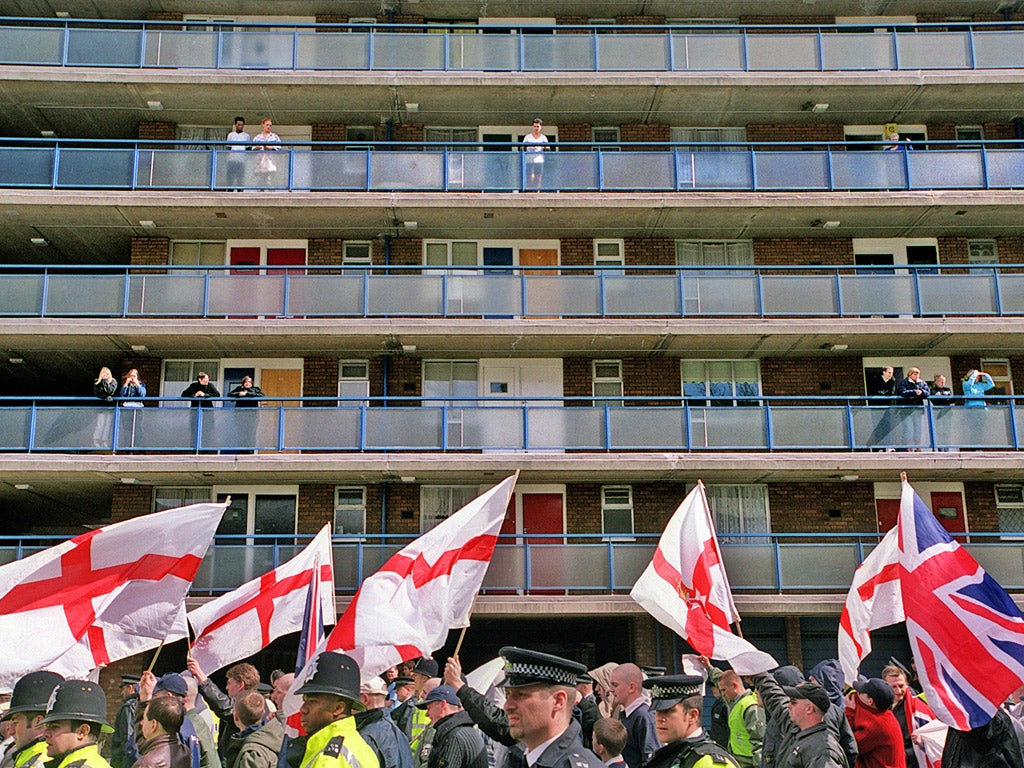National Front aims to revive 70s 'glory days'

In the febrile politics of the 1970s the National Front (NF) ruthlessly exploited working-class fears over immigration to create a far-right threat unseen in Britain since Sir Oswald Mosley.
The party's shows of strength saw police and anti-fascists clash violently on the streets, while at the 1979 general election the NF was able to mobilise more than 300 candidates and attract nearly 200,000 votes.
Yet its decline was as dramatic as it was precipitous. Rocked by a series of internal feuds and the electoral success of the breakaway British National Party (BNP), within a decade the NF was commanding little more than a few dozen supporters.
Now, amid mounting fears that the far right is riding a rising tide of Islamophobia in Britain, the whites-only party is seeking to stage an unlikely comeback. At next month's London Assembly, local council and mayoral elections it is putting up 35 candidates – the highest number it has fielded for 30 years.
Among its hopefuls is a businessman once convicted of assaulting an anti-racism campaigner who hopes to be the first directly elected mayor of Liverpool; a former BNP supporter arrested for burning a copy of the Koran; and Derek Beackon, the notorious far-right councillor.
Sabby Dhalu, of Unite Against Facism, said the NF had re-emerged as a result of a split within the BNP at a time when the movement was on the retreat electorally.
"At the moment we are seeing a decline in the fortunes of fascist parties but I think there could be a problem in the coming years as the Tories become more unpopular, and as we approach the next general election this could deepen," Ms Dhalu said.
In 2010 the BNP was celebrating when it secured European Parliament seats for its leader, Nick Griffin, and Andrew Brons. But last year it was nearly wiped out at local council elections, losing all five seats in its Stoke-on-Trent stronghold. Activists began quitting the party amid mounting financial and legal problems as well as determined opposition on the ground from anti-racism campaigners. However, increasingly shrill media coverage of Islamic issues, such as the deportation of Abu Qatada, and attempts by local racists to take advantage of issues such as alleged sexual grooming gangs, are providing a new touchstone for extremists.
"Islamophobia has some chance of gaining currency in this country as it has done in other European countries," Ms Dhalu said. "You have got the situation where there is a high level of Islamophobia and violent street attacks on Muslims being reported by communities. It is similar to the anti-Semitism that was used in the 1930s."
Last month councillors in Aberdeen voted to ban a march by the NF which would have co-incided with Adolf Hitler's birthday. Grampian Police said it feared the city centre rally could lead to violent clashes.
The current chairman of the NF, Ian Edward, refused to say how many members the party had although it was "a darn sight more than two years ago".
"You will find the party has changed a lot," the self-employed engineer from Hillingdon, north-west London, told i. "It has grown up politically. We are looking to solve the mess this party finds itself in."
An NF activist in the early 1980s and a senior organiser for the BNP, Mr Edward claims he was "purged" in a "witch hunt" by Mr Griffin and his supporters. Yet the party remains true to its 1970s roots. He said: "You have to define what a racist is. We are a racial nationalist party. We love our kith and kin but we are not a white supremacy group. The way the country is at the moment we have become second-class citizens. We offer hope."
But even during its heyday the NF enjoyed little in the way of democratic success.
Its best parliamentary performance came at the West Bromwich by-election in 1973 when it polled 16 per cent, although in the 1976 local elections it could command more than 20 per cent in strongholds such as Leicester, where candidates mobilised support around the arrival of British passport holders from Uganda. However, in the end defecting Tories or independents were its only elected representatives.
Still, Mr Edward likes to think big – particularly on the subject of Islamic repatriation which he admitted was his "ultimate" goal.
"My message would be, in the event of a National Front government we would remove our guns, our bombs, our tanks, our finance and our influence from your country and you must remove yourself from mine," he said.
Join our commenting forum
Join thought-provoking conversations, follow other Independent readers and see their replies
Comments
Bookmark popover
Removed from bookmarks